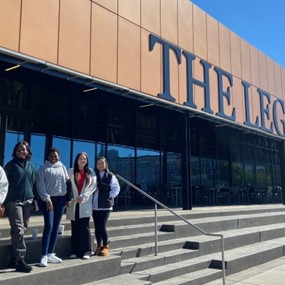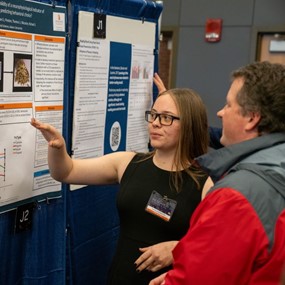Auburn criminology expert explains how prison conditions affect mental health
More than two million people are incarcerated in the United States—a 500% increase from just 40 years ago. As prisons across the country become overcrowded and incarcerated individuals suffer from mental health conditions, understanding the impact of prison environments is increasingly important. Assistant Professor of Sociology and Criminology Timothy Edgemon’s latest work, “Inmate Mental Health and the Pains of Imprisonment,” examines the individual effects of prison conditions and suggests ways to improve mental health outcomes.
What do we know about the relationship between prison and mental health?
Past research considered how prison itself can cause mental health problems, but I tried to disentangle the various aspects of the prison. I looked at how various conditions of confinement impacted mental health differently, and they impacted different facets of mental health differently.
As prisons become more and more overcrowded, this leads to a higher average rate of depression and hostility for people incarcerated in those prisons. People who are in prisons with less overcrowding have less depression and less hostility, and so as overcrowding increases, so do the mental health effects.
A higher proportion of work assignments in the prison is associated with reductions in negative mental health. As people inside of prison have the ability or the option to engage in work activities, that seems to improve their mental health on average.
Higher security-level prisons are associated with increased depression. Another interesting finding in this study is that lack of access to television increases hostility.
Why do prison conditions need to be studied from a sociological perspective?
People go to prison as punishment, not for punishment. No one wants to have their liberty deprived. That's the punishment.
When we talk about prison conditions and conditions of confinement, it's things like overcrowding, exposure to violence or being victimized while in prison. All of that is additional to the punishment that you've been given. It simply isn't the original goal of prison.
The second reason why I think we should be concerned about this is because, insofar as these conditions of confinement impact people and they impact their mental health and they cause negative effects in people, most people that serve a prison sentence will be released back into society.
Past research has shown us that people who go to prison that develop mental health problems because of prison or in relation to it have worse outcomes when they're released. They're not able to find housing, they're not able to find employment and they are more likely to go back into prison. We should be concerned about that from an individual humanitarian perspective, but we should also be concerned about that from a societal perspective. How does this negatively impact our society and our communities?
What would you suggest prisons do to improve inmates’ mental health?
What this research suggests and what past research suggests is that one, we should very seriously consider how conditions of confinement impact people. I think that tends to get lost, so we should really consider how environmental conditions of the prison translate to real impacts in the individuals incarcerated there.
Specifically, how might we improve those environmental conditions? There are numerous ways. The more expensive ways, obviously, are you could add more prison beds to reduce overcrowding, you could add more wings onto a prison or you could build new prisons to reduce overcrowding. I don't necessarily think that's the best way to do it. You could build more prisons or add more beds, but you could also de-incarcerate, so you could divert more people away from prisons. Reimagining other ways to punish is important for reducing overcrowding, and ultimately, reducing environmental concerns of the prison, but that’s a big-picture readjustment.
One thing that I note in the study is that simply adding more recreational opportunities in a prison and not using them as a method of control would be beneficial. And even things like readjusting work priorities, offering more work assignments or increasing the numbers of programs that are available to people would help. But again, that does get back to the issue of funding and back to the issue of overcrowding. Because if your prison is very overcrowded, you are limited in how much you can offer those programs.
About Timothy Edgemon:
Timothy Edgemon is an assistant professor of sociology and criminology in the Department of Sociology, Anthropology & Social Work in the College of Liberal Arts. His research examines links between criminal justice and health outcomes at the individual and societal levels. His current research focuses on the relationship between prison conditions, post-release mental health outcomes and recidivism rates.
Transcript
Brandon Etheredge:
Right now there are over 2 million people imprisoned across the United States, that represents a 500% increase over the last 40 years, and despite making up only 5% of the world's population, America accounts for more than 20% of the world's incarcerations. With prisons across the country, filling up and with most incarcerated individuals suffering from mental health conditions, many of them serious, understanding the impact of those illnesses, both inside and outside the prison walls, is increasingly important.
Brandon Etheredge:
Well, welcome to the third season of the Things You Didn't Know You Didn't Know podcast, I'm Brandon Etheredge, and I'm joined today by Dr. Timothy Edgemon, he is an Assistant Professor of Sociology and Criminology at Auburn University, where he studies the links between criminal justice contact and health disparities. His recent work, Inmate Mental Health and The Pains of Imprisonment, looks at the effect that prisons have on inmates and what can be done to address it.
Brandon Etheredge:
Dr. Edgemon, thanks for spending some time with us today. So let's jump into this study because what you've been working on is really interesting, and looking through the research, you looked at 5,000 incarcerated individuals across more than 200 prisons in the U.S. to see what the impact of incarceration had on these people. But beyond that, from what I understand, this is the first study ever to really account for both individual level and prison level data to see exactly what it is about the prisons that impact mental health. Explain how that works.
Dr. Timothy Edgemon:
Yeah. Without getting too far into the real technical details of the data. So what I did with this study is that I took two large secondary data sets that already exist that were collected by the Bureau of Justice Statistics and the Office of Justice programs. And essentially, the first data set is a large nationally representative data set of people who are incarcerated in prisons across the United States in 2004, so it's a lot of people in a lot of prisons. But that data set is only at the individual level and so it doesn't give you any idea about the prisons that people are actually in or the prison conditions of those prisons that people are incarcerated within.
Dr. Timothy Edgemon:
The second data set that I use is called the Census of Prisons, and essentially, this is a very quick census, that's taken every five years or so of prisons across the United States and it gives you basic information on those prisons, like the number of correctional officers, the number of people in those prisons, the sort of programs that are available in prisons, just very basic census information.
Dr. Timothy Edgemon:
So what I did is that I took those data and I combined them. And again, there was a lot of math involved so I won't get too far into it, but essentially, what I produced is a data step that has, as you said, several thousand people in prison with information about each prison that they are incarcerated in. And so what that lets me do is it lets me look at those prison conditions from the census and pair those with individuals that are grouped in the prison. And so that's how I'm able to account for both individual data of each person and also this prison data, this structural level data, and how that might affect the mental health of people that are in each prison.
Brandon Etheredge:
So let's talk about that specifically, the mental health. Something that many people might say when they hear prison mental health is, "Well, prison isn't supposed to be a good place to be," or "There's a reason people are in prison so they get what they get." Explain why this is an issue that needs to be studied and why we need to solve for it.
Dr. Timothy Edgemon:
Yeah, absolutely. So I get this question actually quite a bit. And when I teach about this in my classes, I often engage students with that very question of, "Well, it's prison, prison is supposed to be bad. You don't want prisons to be good because if prisons were nice places, then no one would be scared about committing a crime and no one would be deterred because who cares because the prisons is not a threat."
Dr. Timothy Edgemon:
There are two main issues here. So the first one I'll say is that there's this idea, and people may have heard about it before, this sort of saying that people go to prison as punishment, not for punishment. So what that means, if we unpack that statement, so people go to prison as punishment, what that means is that prisons are one of our main ways to punish people for crimes. So you commit a crime, you get convicted of an offense, and if the sentence, the judge, or the sentencing commission decides that, "Oh, you're going to go to prison as punishment for that," that is your punishment, it is the deprivation of liberty, right? People don't want go to prison because it's an uncomfortable thing to do in of in itself, right? No one wants to have their liberty deprived, to be put into a place where you do not have any freedom. That's the punishment.
Dr. Timothy Edgemon:
When we talk about prison conditions and conditions of confinement, it's sort of everything else that prisons are not originally supposed to do, so things like overcrowding, things like exposure to violence, or being victimized while in prison, all of that is sort of additional to the punishment that you've been given, right? You go to prison as punishment but you don't go to prison to be punished while you're there, you don't go to prison to be stabbed or to be shanked or to be exposed to extremely harsh conditions that break you down, that impact your mental health. So while prisons are supposed to deprive you of your liberty, they're not necessarily supposed to put you in a cell that was designed for one person but, in reality, is holding five people, that is extra to what the prison is supposed to do. So that's really the first reason why we should be concerned about these particularly depriving conditions of prison, it simply isn't how prison should be set up and is not the original goal of them.
Dr. Timothy Edgemon:
The second reason why I think we should be concerned about this is because insofar, as these conditions of confinement impact people and they impact their mental health and they cause negative effects in people, well, most people that go to prison are going to be released, right? Most people that serve a prison sentence will be released back into society. The average prison sentence is about 10 years, upwards of 95% of people that go to prison are not there for life, they're serving a sentence and they're going to be placed back into society. We should probably care what happens to them when they go to prison.
Dr. Timothy Edgemon:
So past research has shown us that people who go to prison that develop mental health problems because of prison or in relation to it have worse outcomes when they're released, they're not able to find housing, they're not able to find employment, and they are more likely to go back into prison. And so we should care that if we take a 20-year-old who doesn't have mental health problems and they go to prison, and because of these conditions of confinement, they develop a lot of mental health problems, we should be concerned about that, we should be concerned about that from an individual humanitarian perspective, but we should also be concerned about that from a societal perspective. Insofar as how does this negatively impact our society, how does this negatively impact our communities, where people are being drawn from, incarcerated from, and then they go back, what happens to those communities?
Brandon Etheredge:
Okay so now that we understand kind of why this is important, let's jump into a little bit of what you found in the data. What about prison increases or decreases the likelihood of someone having mental health issues down the road?
Dr. Timothy Edgemon:
Yeah. So just some specific things that I found within this study within these data. So essentially what I did is that I looked at various conditions of confinement. So past research is sort of considered how prison itself can cause mental health problems, but I tried to disentangle the various aspects of the prison. So I looked at things like how overcrowding is associated with mental health, how the security level of the prison is associated with mental health, how being away, being a certain distance away from home is associated with negative mental health. And so essentially what I found is that these conditions of confinement, these various conditions of confinement, impacted mental health differently, and they impacted different facets of mental health differently.
Dr. Timothy Edgemon:
So a couple of specific findings that I see here is that overcrowding, so as prisons become more and more overcrowded, this leads to a higher average rate of depression and hostility for people incarcerated in those prisons. So people who are in prisons with less overcrowding have less depression, less hostility, and so as overcrowding increases so do the mental health effects.
Dr. Timothy Edgemon:
Some other things, having access to work assignments in the prison, so a higher proportion of work assignments in the prison is associated with reductions in negative mental health, so it improves mental health, essentially. So as people inside of prison are able to access work or have the ability or the option to engage in work activities, that seems to improve their mental health on average.
Dr. Timothy Edgemon:
Security levels, so higher security level prisons are associated with increased depression. So people in maximum and medium security institutions on average are more depressed than those who are in minimum security institutions.
Dr. Timothy Edgemon:
And then another interesting finding that I found in this study is that lack of access to television, I should say, increases hostility. So people in prisons where television is not allowed or where they have restricted access to television have increased hostility than people who are in prisons where television is allowed or where there aren't blockages to television, which I thought was kind of an interesting sort of finding in there.
Dr. Timothy Edgemon:
In addition to all of that, I also, what this study does and how it contributes to sort this idea is that I also controlled for a lot of life history factors that we know are associated with negative mental health. So for each person, I look at how histories of trauma and abuse impact their mental health, so if they have been exposed to physical and sexual abuse in their life, how that impacts their mental health, and how substance abuse, how unemployment, how homelessness before prison, how all of those are associated with mental health. And I find that as we would expect, all of those life experience factors have impacts on mental health.
Brandon Etheredge:
Right.
Dr. Timothy Edgemon:
But setting those aside, we also see that these prison conditions are exerting impacts on individual mental health as well, and that's really the novel contribution of this study is that, yes, we know these life experience factors all impact mental health, but even when we account for all of that, look, the prison environment is also exerting an influence.
Brandon Etheredge:
So you've done a lot of work in this area and looking at mental health in incarcerated individuals. So was there anything about this specific research that surprised you or that you weren't expecting when you started going through the data?
Dr. Timothy Edgemon:
So I think the most surprising, or maybe the most interesting thing about this study is that so I considered... I divided mental health into two different aspects, so I look at depression and I look at hostility. There are numerous other ways to look at mental health, you can look at anxiety, you can look at general stress, right? So there are various ways that you can assess mental health. But I look at depression and hostility, and one of the interesting things that I found is that different prison conditions impact different facets of mental health, which I thought was kind of cool and I didn't necessarily expect it going in.
Dr. Timothy Edgemon:
So for example, security level has an effect on depression. So people in higher security prisons on average or more depressed, it has no effect on their hostility, right? So it seems to impact their depression but not so much their hostility. Whereas what I was talking about with television, lack of access to television seems to increase hostility, but it doesn't increase depression. And so I think that's sort of an interesting idea in the study is that different prison conditions might impact mental health differently so it really depends on what you're looking at.
Dr. Timothy Edgemon:
And I think that reinforces this idea that prisons are not monolithic institutions, meaning that prisons are different, prisons vary from each other, and specific prison conditions also vary. So a prison may be very overcrowded but it may be a lower security prison. If you just look at security level, then you might not see the effect that that person is having on people. So it's important to understand that we need to disentangle all of these prison conditions and consider how each of them impact people.
Dr. Timothy Edgemon:
The other sort of idea there is that mental health itself is, again, not monolithic, but there are a lot of ways to look at mental health, and if you're just looking at depression or you're just looking at general stress, you might miss how these prison environments and how social environments impact people. So I think it's just a good idea to keep in mind that when we consider how prisons affect inmates and people incarcerated in prison, we need to get at it from a lot of different angles to really understand the true effect that's going on.
Brandon Etheredge:
So when we're looking at all of these prisons that you evaluated and these individuals, was there any prisons or prison systems that seemed to be doing better at mitigating for mental health issues in their population than others?
Dr. Timothy Edgemon:
That's a really good question. I didn't group prisons by prison system so I didn't look at state by state.
Brandon Etheredge:
Right.
Dr. Timothy Edgemon:
But it's something that I would like to do in the future because I could do that in these [inaudible 00:14:30]. That's a really good question. I will say that in past research, and I expect it's the same here, that generally, prison systems in the south fare worse, so in the Southeast, so Tennessee, Georgia, Alabama, Mississippi, Louisiana, the deep south, typically those prison systems fare worse than prison systems in the Northeast and in some prison systems in the Midwest. And so, typically, what we see are that prisons in the south, people incarcerated in prisons in the south generally have worse mental health problems and more mental health problems than people incarcerated in other areas. So I would expect that would be the same in these data, but I haven't looked at it specifically.
Brandon Etheredge:
Very interesting. So I want to get really practical for a minute. If the leaders of the Department of Corrections or the Department of Justice are listening to the podcast, what are practical policy changes or environmental adjustments that can be made to improve mental health for prisoners in their care?
Dr. Timothy Edgemon:
Yeah. So I think that prison administrators DOG, DOJ are aware of these so I don't think that I'm necessarily saying anything that they haven't thought about, but what this research suggests and what past research suggests is that, one, we should very seriously consider how conditions of confinement impact people. I think that tends to get lost so we should really consider how environmental conditions of the prison translate to real impacts in the individuals incarcerated there. Typically, we focus a lot on those individual factors that I noted before. How does being physically abused or being sexually abused or being addicted to certain substances, drugs and alcohol, how do all of those translate to behavioral outcomes of people in prison?
Dr. Timothy Edgemon:
Those are all important, and I'm not suggesting that we shouldn't look at those, but too often, I think, we pool our resources into those sort of screeners. When people get into prison we ask, "Oh, what are your life experience factors?" and then sort them based on those screeners. I think that what tends to get lost is, "Okay, well, if you go into an overcrowded prison, how does that in itself affect you?" And so I think more attention to understanding how those environmental conditions impact people is important at the policy level.
Dr. Timothy Edgemon:
Now, specifically, how might we improve those environmental conditions? There are numerous ways. So the more expensive ways, obviously, are you could add more prison beds to reduce overcrowding, you could add more wings onto a prison, you could build new prisons to reduce overcrowding. I don't necessarily think that's the best way to do it. You could build more prisons or add more beds, but you could also deincarcerate, so you could divert more people away from prisons. So I think looking at why do people go to prison and are there people that we can simply put somewhere else or reimagining how we punish people, right? Not just using prisons, but reimagining other ways to punish, I think is important for reducing overcrowding and, ultimately, reducing these environmental concerns of the prison.
Dr. Timothy Edgemon:
But again, that's pretty big picture, right? That really involves a readjustment of how we punish and-
Brandon Etheredge:
Right.
Dr. Timothy Edgemon:
... sort of our ideas about punishment, right? Sort of maybe more accessible things to improve environmental conditions. One thing that I note in the study is that that sort of interesting finding with television is that it could be the case that simply adding more recreational opportunities in a prison and not using them as a method of control would be beneficial. So often television is used as a way to control inmates or to give them good behavior incentives, but if you just give that as a baseline that might help to improve the mental health impacts of the environment. And even things like readjusting work priorities, offering more work assignments, increasing the numbers of programs that are available to people, I think all of that would help. But again, that does get back to the issue of funding and back to the issue of overcrowding. Because if your prison is very overcrowded, you are limited in how much you can offer those programs.
Brandon Etheredge:
Right. So as we begin to wrap up here, where do we go next? What are you looking at now and what can we expect from these current studies you're working on as we continue this conversation?
Dr. Timothy Edgemon:
Yeah. So the area that I'm really interested in as I push forward with my research is looking at how these environmental conditions impact people who are incarcerated in prison, but then understanding what happens when people are released. So if someone goes to an overcrowded prison or someone has these negative experiences while they're incarcerated, maybe they're exposed to violence or either they witness violence or they've been assaulted while in prison, how does all of that impact them after they leave prison?
Dr. Timothy Edgemon:
Again, going back to that, one of the first things that I sort of noted is that most people leave prison, most people are going to be released. So what happens to you after you've been exposed to these conditions? Does your mental health improve after you've been released or do we find that these negative effects of incarceration continue to follow you across your life, right? Does going to an overcrowded prison negatively impact your depression or your mental health five years after you've been released? And so a lot of my current research is sort of pushing in that direction of looking at what happens to people, what happens to people when they leave, and is that ultimately associated with them going back to prison with recidivism? And so that's really what I'm currently looking at right now.
Brandon Etheredge:
That is incredibly interesting, and I can't wait to see what those studies find, and we'll make sure to have you back on the podcast once we get to that point. But, Dr. Edgemon, thank you so much for your insight, helping us understand this issue and the solutions that your work has brought forward. We'll definitely get you back on sometime in the near future, depending on how long that work takes. But to all of our listeners here in America and around the world, we thank you for joining us for another episode of the Things You Didn't Know You Didn't Know podcast. Make sure you subscribe to the show wherever you get your podcasts and leave us a five-star review, it helps us out more than you know. We'll see you next time on the Things You Didn't Know You Didn't Know podcast.
Tags: Sociology






